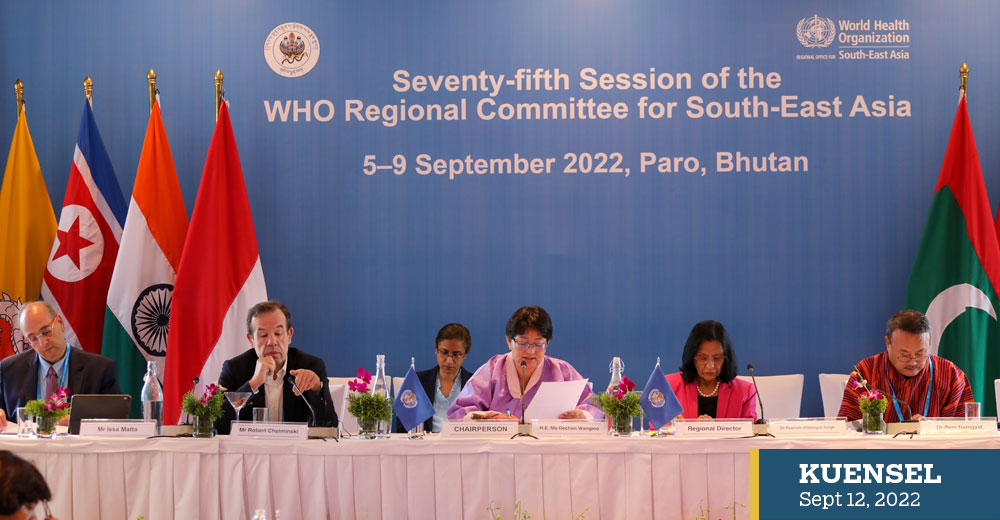Nima Wangdi
At the conclusion of the 75th session of the Regional Committee (RC) for the World Health Organization (WHO) South-East Asia Region (SEAR) in Paro yesterday, member countries committed to resilient health systems and accelerating multi-sectoral actions to address priority health issues.
They also agreed to re-energising comprehensive primary health services to build societies that are more inclusive, equitable and resilient against present and future emergencies.
Regional director, Dr Poonam Khetrapal Singh, said that the region and the world, over the past two and a half years, have witnessed immense transformative change. “We are at a history-defining juncture.”
She added: “Spending more on health is not important but spending efficiently and equitably is. Our focus must be on vulnerable populations, we must identify them and see how best we can address their needs.”
No one, she emphasised, should be left behind as all the member states seek to drive rapid and sustained progress towards universal health coverage, health security, and health for all.
Based on the lessons learnt from the ongoing Covid-19 pandemic, countries committed to strengthening emergency preparedness and building health systems that are also resilient to the environment and climate change.
The annual Regional Committee (RC) adopted the Paro Declaration to address mental health through primary care and community engagement. RC also adopted resolutions to accelerate progress for non-communicable diseases; including oral health and integrated eye care and promotion of social participation to strengthen primary health care in support of universal health coverage.
Press release from WHO stated: “Recognizing that climate action is health action, the Regional Committee decided to extend the Regional Framework for Action in Building Health Systems Resilient to Climate Change (2017-2022) till 2027.”
Member countries also committed to accelerating efforts to eliminate cervical cancer and achieve end-TB targets.
The five-day meeting endorsed Implementation Roadmap for the prevention and control of non-communicable diseases in South-East Asia 2022–2030, and two action plans for oral health in South-East Asia 2022–2030 and for integrated people-centred eye care in South-East Asia 2022–2030.
The RC emphasised the need to revitalise regional knowledge and experience-sharing mechanisms aligned with national, regional and global goals for strengthening comprehensive people-centred primary health services and health systems. This is in response to public health priorities such as mental health, non-communicable diseases, emergencies and pandemics, including Covid-19 and, more recently, monkeypox.
The Regional Strategy Roadmap on Health Security and Health System Resilience for Emergencies 2023-2027, WHO South-East Asia Regional Roadmap for Diagnostic Preparedness and Integrated Laboratory Networking and Genomic Surveillance 2023-2027 were also adopted.
Member countries sought support in building strong health information systems for evidence and good quality data to guide preparedness and response.
The RC also reviewed progress reports on its previous resolutions and decisions on the regional action plan on health, environment and climate change.
Update on health flagship programs
Sharing the progress of the flagship programmes in the country to the RC, Sowa Lyonpo Dechen Wangmo said that Bhutan gave special attention to three out of the eight regional priority flagships.
She said that efforts are being made to enhance the timely diagnosis and treatment to curtail NCD-related mortality and morbidity.
“Mother and Child Health services are being expanded across the nation to enhance equitable access to timely and quality MCH services,” Lyonpo said, adding that the endorsement of the Accelerating Mother and Child Health Policy would address the imperative and critical nutritional and health needs during the first 1000 days of a person’s life.
Lyonpo also said that innovative programmes are being designed to enhance compliance to TB treatment through community empowerment and engagement.
The RC meeting started on September 4; some 300 delegates from 11 member states attended the meeting.


